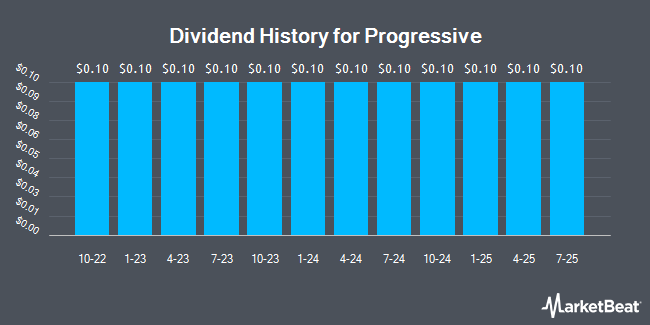The Progressive Corporation (NYSE:PGR - Get Free Report) declared a dividend on Tuesday, July 1st, investing.com reports. Shareholders of record on Friday, July 4th will be given a dividend of 0.10 per share by the insurance provider on Friday, July 11th. This represents a yield of 0.15%. The ex-dividend date of this dividend is Thursday, July 3rd.
Progressive has a dividend payout ratio of 2.5% meaning its dividend is sufficiently covered by earnings. Analysts expect Progressive to earn $15.40 per share next year, which means the company should continue to be able to cover its $0.40 annual dividend with an expected future payout ratio of 2.6%.
Progressive Price Performance
Shares of PGR stock traded down $6.55 during trading hours on Wednesday, reaching $257.75. The company had a trading volume of 3,422,728 shares, compared to its average volume of 2,770,179. Progressive has a 12-month low of $207.50 and a 12-month high of $292.99. The company has a market capitalization of $151.10 billion, a price-to-earnings ratio of 17.38, a PEG ratio of 1.62 and a beta of 0.37. The company has a debt-to-equity ratio of 0.24, a quick ratio of 0.29 and a current ratio of 0.29. The stock has a fifty day moving average of $274.62 and a 200-day moving average of $265.16.
Progressive (NYSE:PGR - Get Free Report) last issued its earnings results on Wednesday, April 16th. The insurance provider reported $4.65 earnings per share (EPS) for the quarter, topping analysts' consensus estimates of $4.28 by $0.37. Progressive had a return on equity of 33.50% and a net margin of 11.10%. The business had revenue of $22.21 billion during the quarter, compared to the consensus estimate of $21.87 billion. On average, equities analysts anticipate that Progressive will post 14.68 earnings per share for the current year.
Analysts Set New Price Targets
Several analysts have recently weighed in on the stock. Wells Fargo & Company increased their price target on shares of Progressive from $328.00 to $333.00 and gave the company an "overweight" rating in a research note on Friday, June 20th. Wall Street Zen raised Progressive from a "hold" rating to a "buy" rating in a research note on Saturday, June 21st. BMO Capital Markets lifted their target price on Progressive from $282.00 to $288.00 and gave the company an "outperform" rating in a research report on Thursday, April 17th. UBS Group raised their price objective on Progressive from $285.00 to $291.00 and gave the stock a "neutral" rating in a research report on Wednesday, May 28th. Finally, JPMorgan Chase & Co. increased their target price on shares of Progressive from $267.00 to $287.00 and gave the stock an "overweight" rating in a research note on Tuesday, April 8th. Seven investment analysts have rated the stock with a hold rating and twelve have issued a buy rating to the company's stock. According to data from MarketBeat.com, the stock presently has an average rating of "Moderate Buy" and a consensus price target of $288.88.
View Our Latest Analysis on Progressive
Insider Activity
In other Progressive news, CFO John P. Sauerland sold 10,000 shares of the stock in a transaction that occurred on Monday, June 30th. The shares were sold at an average price of $263.79, for a total transaction of $2,637,900.00. Following the sale, the chief financial officer directly owned 228,024 shares in the company, valued at $60,150,450.96. This represents a 4.20% decrease in their position. The transaction was disclosed in a filing with the Securities & Exchange Commission, which is available through this link. Also, Director Dyke Kahina Van sold 2,490 shares of the company's stock in a transaction on Thursday, May 22nd. The stock was sold at an average price of $277.67, for a total value of $691,398.30. Following the sale, the director directly owned 12,429 shares in the company, valued at $3,451,160.43. This represents a 16.69% decrease in their position. The disclosure for this sale can be found here. Insiders sold 42,705 shares of company stock worth $11,450,948 over the last 90 days. Company insiders own 0.34% of the company's stock.
Institutional Trading of Progressive
Large investors have recently made changes to their positions in the company. Revolve Wealth Partners LLC purchased a new stake in shares of Progressive in the 4th quarter valued at approximately $269,000. Bison Wealth LLC grew its stake in shares of Progressive by 3.2% during the fourth quarter. Bison Wealth LLC now owns 2,568 shares of the insurance provider's stock worth $615,000 after purchasing an additional 80 shares in the last quarter. Finally, Brighton Jones LLC increased its holdings in Progressive by 15.6% in the fourth quarter. Brighton Jones LLC now owns 3,392 shares of the insurance provider's stock valued at $813,000 after buying an additional 457 shares during the last quarter. 85.34% of the stock is currently owned by hedge funds and other institutional investors.
About Progressive
(
Get Free Report)
The Progressive Corporation, an insurance holding company, provides personal and commercial auto, personal residential and commercial property, business related general liability, and other specialty property-casualty insurance products and related services in the United States. It operates in three segments: Personal Lines, Commercial Lines, and Property.
See Also

Before you consider Progressive, you'll want to hear this.
MarketBeat keeps track of Wall Street's top-rated and best performing research analysts and the stocks they recommend to their clients on a daily basis. MarketBeat has identified the five stocks that top analysts are quietly whispering to their clients to buy now before the broader market catches on... and Progressive wasn't on the list.
While Progressive currently has a Moderate Buy rating among analysts, top-rated analysts believe these five stocks are better buys.
View The Five Stocks Here
Almost everyone loves strong dividend-paying stocks, but high yields can signal danger. Discover 20 high-yield dividend stocks paying an unsustainably large percentage of their earnings. Enter your email to get this report and avoid a high-yield dividend trap.
Get This Free Report
Like this article? Share it with a colleague.
Link copied to clipboard.